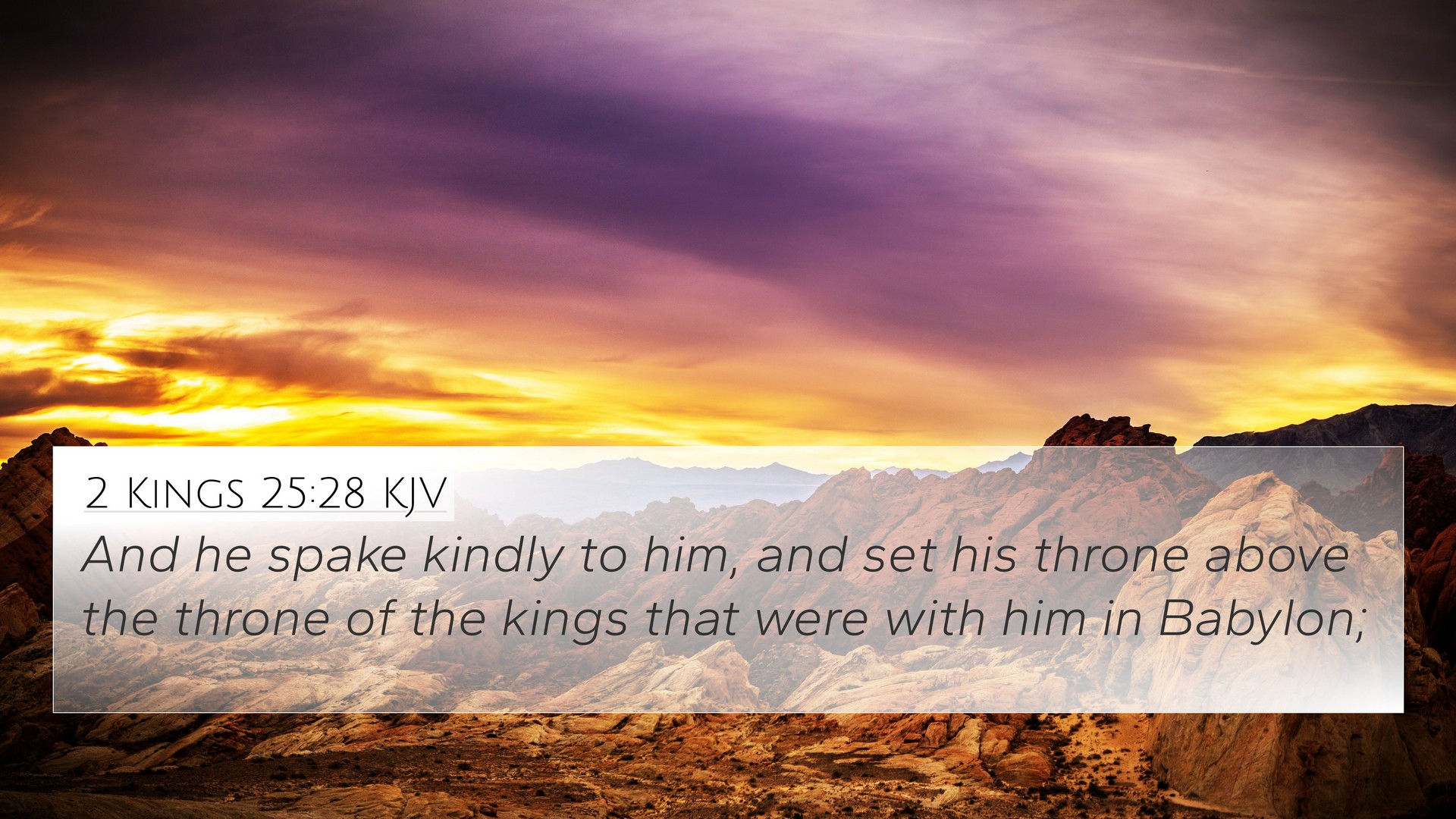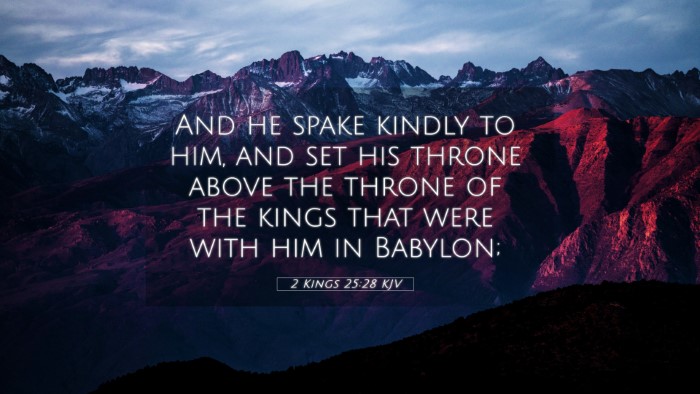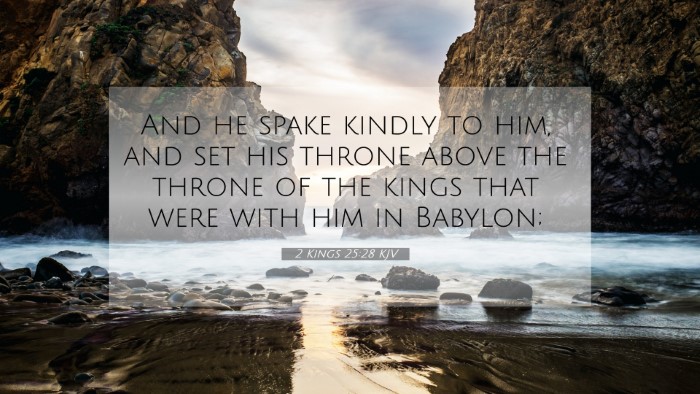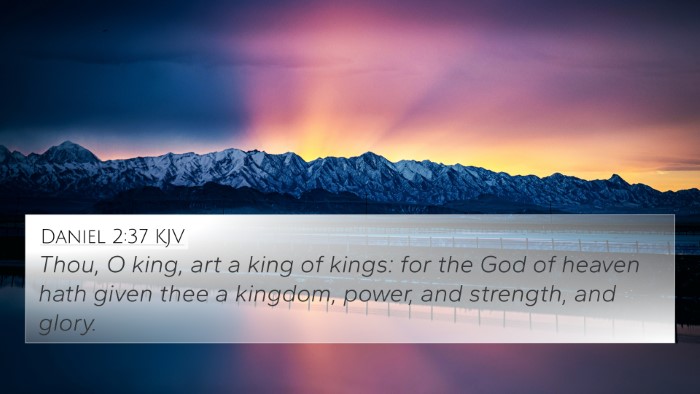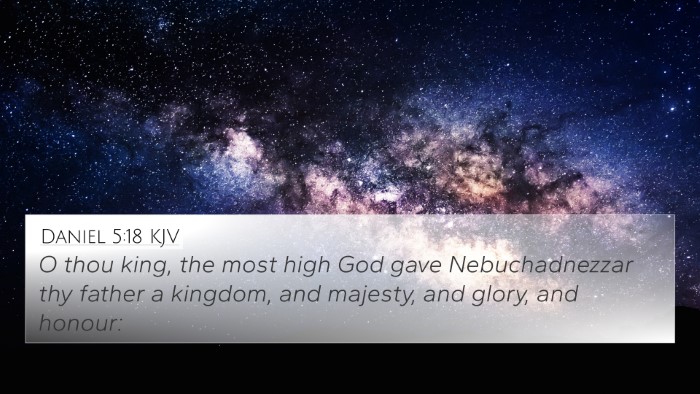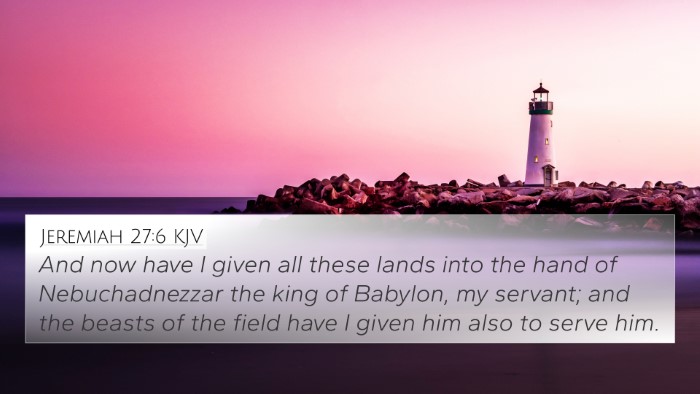Understanding 2 Kings 25:28
Verse: 2 Kings 25:28 - "And he spoke kindly to him, and set his throne above the thrones of the kings that were with him in Babylon."
Summary of the Verse Meaning
This verse describes a moment of compassion shown by Evil-merodach, the king of Babylon, towards Jehoiachin, the former king of Judah. After a period of imprisonment, Jehoiachin is treated kindly and promoted in status, indicating a shift from judgment to grace in his life. This act signifies mercy and restoration, often seen as a mirror to God's goodness towards His people.
Thematic Insights from Public Domain Commentaries
Matthew Henry's Commentary
Matthew Henry notes that this encounter represents God's mercy. Despite the dire circumstances of captivity, Jehoiachin receives favor in Babylon, illustrating that God's providence works even amidst trials. Henry emphasizes the significance of Jehoiachin’s elevation, showing how God can turn despair into hope.
Albert Barnes' Notes
Barnes focuses on the character of Evil-merodach, highlighting his unexpected kindness and the political wisdom behind his actions. By promoting Jehoiachin, he aims to pacify the Jewish people and gain their loyalty. Barnes also reflects on the unconditional nature of divine mercy and reminds readers of the importance of humility in receiving grace.
Adam Clarke's Commentary
Clarke provides historical context, noting that Jehoiachin’s release after thirty-seven years of captivity was not only a personal restoration but a message of hope. Clarke points out that this act fulfilled God's promise to preserve the Davidic line, illustrating God's faithfulness even when His people falter. This connection serves as a reminder of the broader narrative of redemption that runs through Scripture.
Cross-References
To better understand 2 Kings 25:28, consider the following related verses:
- Jeremiah 52:31: Provides further context regarding Jehoiachin's release and the kindness shown to him.
- Ezekiel 1:2: Mentions the captivity and supports the timeline of Jehoiachin’s downfall.
- 2 Chronicles 36:20-21: Discusses the fate of Judah and the prophetic nature of captivity.
- Isaiah 14:1-2: Foretells a return from captivity and restoration of Israel, indicating a broader redemptive theme.
- Daniel 1:1-2: Offers insight into the Babylonian captivity and the reasons behind it.
- Psalm 137:1: Reflects the emotions of those in captivity, setting a tone for Jehoiachin's situation.
- Lamentations 3:22-23: Speaks of God’s mercies being new every morning, resonating with Jehoiachin’s elevation.
Exploring Connections Between Bible Verses
The act of kindness extended to Jehoiachin can be seen as a pivotal moment echoing throughout Scripture. This verse, when cross-referenced, helps illustrate the concept of mercy and restoration. Notably, it highlights God’s continual work in the lives of His chosen people, emphasizing that even in times of suffering, there is a possibility of grace and redemption.
Linking Bible Scriptures
2 Kings 25:28 initiates a dialogue with various themes present within the Bible, including:
- The Role of Rulers: How God influences the hearts of leaders to offer mercy (Proverbs 21:1).
- Restoration after Judgement: Link to 2 Chronicles 36:22-23, highlighting God’s faithfulness in restoring His people.
- God’s Sovereignty: Assures believers that He is in control, such as noted in Romans 8:28.
Comparative Bible Verse Analysis
Upon a detailed analysis, 2 Kings 25:28 correlates to themes of restoration and mercy found in the Psalms, such as the cries for help and reminders of God's unwavering love and compassion (Psalm 51:17). Using tools for Bible cross-referencing, one can observe how different narratives connect, enriching the study of scriptural truths.
Practical Tools for Cross-Referencing
For those interested in exploring the interconnections of biblical texts, consider utilizing:
- Bible Concordance: Helps locate verses based on themes or keywords.
- Bible Cross-Reference Guide: Serves as a structured method to find related passages.
- Bible Cross-Reference System: A framework that assists in thematic studies across different scripture portions.
Concluding Thoughts
2 Kings 25:28 exemplifies the overarching themes of mercy and divine favor within the biblical narrative. The connections found in systemic cross-referencing bring forth a deeper understanding of God’s characterization throughout the scripture. By studying these relationships, individuals can enhance their comprehension of biblical themes and apply these insights to their spiritual growth.
